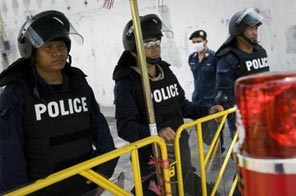Two more blasts hit Thailand amid protests
BANGKOK: Thailand said Thursday it would upgrade security measures after two more blasts hit government buildings, the latest in a string of minor attacks since anti-government protests erupted this month.
The rallies mounted by supporters of ousted premier Thaksin Shinawatra have been met with a heavy security deployment, including a lockdown on parliament that has triggered an opposition boycott.
Authorities said that the new blasts, which hit a provincial hall on Bangkok's northern outskirts and a government building west of the capital on Wednesday, had hit weak spots in the operation involving 50,000 personnel.
"We have to adjust our operation to curtail the attacks," Deputy Prime Minister Suthep Thaugsuban told reporters at parliament, adding that he had instructed officials to step up security measures.
"Intelligence reports say they want to create unrest to show that the government cannot control the situation, but I want to reassure the Thai people that the government is in control," he said.
The blasts, which follow eight other minor explosions since the protests began on March 14, caused minor damage but no injuries.
Most of the incidents have involved grenades, but police investigating the provincial hall blast said they believed it was a TNT explosive device.
Prime Minister Abhisit Vejjajiva on Tuesday extended a tough security law enacted for the demonstrations, applying it to Bangkok and nearby districts for an additional week as the red-shirted protesters vowed fresh actions.
Opposition Puea Thai lawmakers boycotted parliament for a second day Thursday to protest tight measures including concrete and razor-wire barricades surrounding the building and thousands of soldiers and police on duty.
The president of the upper house Senate, Prasobsuk Boondej, also criticised the military presence as an over-reaction and said some senators had problems entering the building.
Abhisit, who has said the measures are aimed at preventing a repeat of the siege on parliament in 2008, rejected opposition allegations that the response was "a version of a coup."
Soldiers and police "have not come to seize legislative power, they want to ensure that we can exercise our legislative power, in fact they are protecting democracy," the premier said in parliament.






